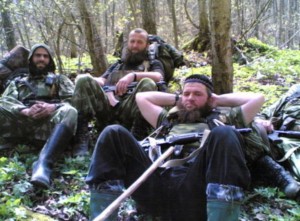Islamic State made its debut appearance in Russia late last year when it claimed responsibility for two attacks in the North Caucasus region, marking a deadly new security threat, a report said.
The emergence of the group in Russia came amid a “no prisoners” approach by security forces fighting Islamist militants in a crackdown that led to a significant reduction in terrorist attacks in 2015, according to the study to be published by the independent Caucasian Knot news and research service on Thursday.
“2015 was the year of Islamic State and, despite successes in fighting against them in part of the Northern Caucasus, they remain capable of conducting their operations,” said Grigory Shvedov, head of Caucasian Knot. “Russian bombing in Syria, the closing of mosques in Dagestan, this is the context that strengthens their mobilization of resources and the risks of new attacks.”
Russia is on alert for a resurgence of terrorism after President Vladimir Putin ordered airstrikes in September against Islamic State and other militants fighting Bashar al-Assad’s regime in Syria. Islamic State claimed it blew up a Russian airliner over Egypt in October, killing 224 on board, as revenge for the military campaign. The authorities haven’t acknowledged any attack by the group in Russia, though Alexander Bortnikov, head of the Federal Security Service, or FSB, said in December that 20 out of 26 militant leaders who’ve sworn an oath to Islamic State have been killed.
Sworn Allegiance
Putin has justified Russia’s Syrian actions by saying that as many as 7,000 people from Russia and former Soviet states have left to join Islamic State and “can’t be allowed to apply later on at home the experience they are gaining today in Syria.”
Militants in the North Caucasus who’d sworn allegiance to Islamic State attacked a Russian military base in Magaramkent, southern Dagestan, on September 2, killing and wounding civilians, according to the U.S. State Department. Caucasian Knot said that Islamic State claimed responsibility for a gun attack that killed one man and wounded 11 people in the Dagestani city of Derbent late on Dec. 29, although Russia’s Investigative Committee didn’t mention the group or classify it as a terrorist incident in its report.
It wasn’t possible to verify the U.S. report of the attack on the Russian base as neither the authorities nor people living locally would confirm it, Shvedov said.
Security services killed 150 militants during operations in 2015, Evgeny Ilyin, first deputy head of Russia’s National Antiterrorism Committee, said last week. More than 100 Russian citizens were prevented from traveling to Syria to join Islamic State.
Armed Clashes
There were 172 militants killed by security forces last year and only two who were wounded, according to Caucasian Knot. “The tendency not to capture militants alive has reached its peak,” Shvedov said.
There were 86 armed clashes in the North Caucasus last year, a 39 percent decline compared to 2014, according to the report received by Bloomberg before its release on Caucasian Knot’s website. Total fatalities in the region also fell by 39 percent to 209, it said.
The security services have battled a domestic militant insurgency in the North Caucasus for more than 20 years since Russia fought two wars to crush separatists in Chechnya after the collapse of the Soviet Union. Islamist radicals have carried out brutal terrorist attacks including the 2002 hostage-taking at the Nord-Ost theater in Moscow, which led to 170 deaths, the 2004 seizure of a school in Beslan that resulted in more than 380 fatalities and the dual suicide bombings in Moscow subway stations in 2010 that killed at least 40.
bloomberg.com



